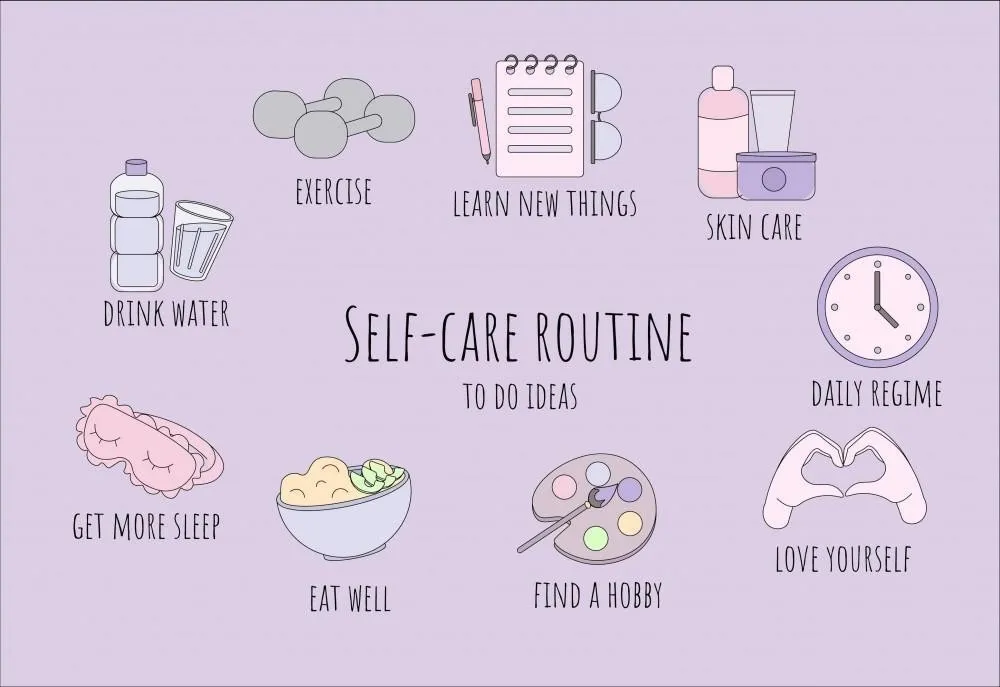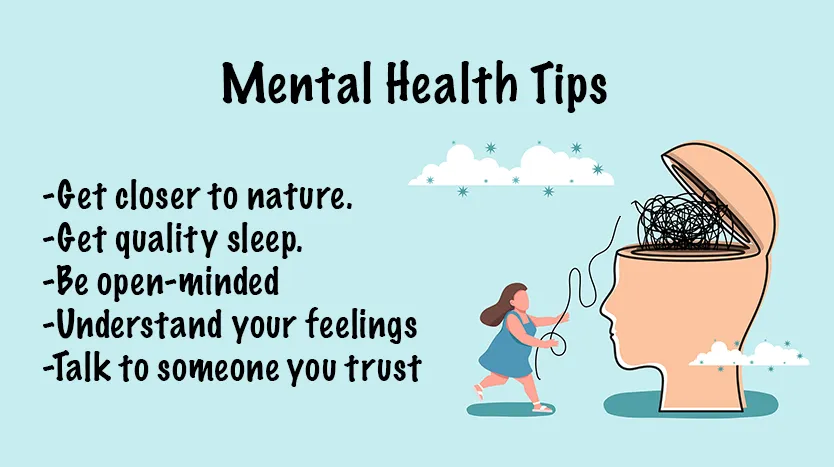Mental health is an essential aspect of overall well-being, and just like physical health, it requires attention and care. In today’s fast-paced world, where stress, anxiety, and burnout are increasingly common, developing a self-care routine for mental health has never been more important. A consistent self-care routine can help you manage stress, improve your mood, and cultivate a positive outlook on life. This article explores practical steps to create a self-care routine that prioritizes mental health and fosters emotional resilience.
1. Understanding the Importance of Self-Care for Mental Health
Self-care refers to the actions we take to look after our physical, emotional, and mental well-being. It’s a proactive approach to maintaining good health and reducing the risk of mental health challenges such as depression, anxiety, and stress. Self-care for mental health is not just about taking breaks or pampering yourself—it’s about developing habits that support emotional resilience and overall well-being.
A consistent self-care routine helps you manage your emotions, improve your self-esteem, and better cope with the demands of life. The mental health benefits of self-care include reduced stress levels, improved mood, better concentration, and increased emotional stability.
2. Start with Mindfulness and Meditation
Mindfulness and meditation are powerful tools for managing stress and enhancing mental clarity. These practices help you focus on the present moment, reduce negative thinking, and increase awareness of your emotions. Incorporating mindfulness into your daily routine can provide immediate relief from anxiety and help build long-term emotional resilience.
How to Practice Mindfulness:
- Mindful Breathing: Spend a few minutes each day focusing on your breath. Inhale deeply, hold for a few seconds, and exhale slowly. This can help calm your nervous system and clear your mind.
- Body Scan: Perform a body scan by mentally scanning each part of your body, starting from your toes and moving upwards. Pay attention to any tension or discomfort and consciously relax each area.
- Guided Meditation: Use meditation apps or online videos that provide step-by-step guidance on mindfulness techniques.
Benefits of Mindfulness for Mental Health:
- Reduces stress and anxiety
- Increases emotional regulation
- Improves focus and concentration
- Promotes relaxation and well-being
3. Prioritize Physical Activity
Physical health and mental health are closely linked. Regular exercise has been shown to reduce symptoms of depression, anxiety, and stress. When you exercise, your body releases endorphins, which are natural mood elevators. Exercise also boosts self-esteem, improves sleep quality, and increases overall energy levels.
Incorporating Exercise into Your Routine:
- Start Small: Begin with short walks or light stretching if you’re new to exercising. Gradually increase the intensity as you feel comfortable.
- Engage in Enjoyable Activities: Choose activities that you enjoy, whether it’s dancing, yoga, cycling, or swimming. Enjoying the process makes it easier to stick with it.
- Consistency is Key: Aim for at least 30 minutes of physical activity most days of the week to reap the mental health benefits.
Benefits of Exercise for Mental Health:
- Reduces symptoms of depression and anxiety
- Boosts mood and energy levels
- Enhances sleep quality
- Improves self-esteem and confidence
4. Establish Healthy Sleep Habits
Sleep is crucial for mental health. Poor sleep can lead to irritability, difficulty concentrating, and an increased risk of mental health conditions such as anxiety and depression. Establishing a consistent sleep routine can significantly improve your emotional well-being and overall mood.
Tips for Better Sleep:
- Create a Relaxing Bedtime Routine: Engage in calming activities before bed, such as reading, listening to soothing music, or practicing relaxation techniques.
- Set a Consistent Sleep Schedule: Go to bed and wake up at the same time every day, even on weekends, to regulate your body’s internal clock.
- Limit Screen Time: Avoid using electronic devices at least an hour before bed, as the blue light emitted can interfere with sleep patterns.
Benefits of Sleep for Mental Health:
- Reduces stress and anxiety
- Improves cognitive function and memory
- Enhances mood stability
- Promotes emotional regulation
5. Nourish Your Body with Healthy Foods
What you eat has a direct impact on your mental health. A balanced diet rich in nutrients helps regulate mood, reduce stress, and improve cognitive function. Foods high in antioxidants, omega-3 fatty acids, and vitamins can support brain health and emotional well-being.
Incorporating Nutrient-Rich Foods:
- Eat a Balanced Diet: Include plenty of fruits, vegetables, whole grains, lean proteins, and healthy fats in your meals.
- Limit Processed Foods: Avoid excessive consumption of sugary, fried, or processed foods, which can negatively impact mood and energy levels.
- Stay Hydrated: Drink plenty of water throughout the day to stay hydrated, as dehydration can cause irritability and fatigue.
Benefits of Healthy Eating for Mental Health:
- Boosts mood and emotional well-being
- Improves brain function and memory
- Reduces stress and anxiety
- Increases energy levels and vitality
6. Connect with Others
Social connections are essential for mental health. Loneliness and isolation can contribute to feelings of depression and anxiety, while meaningful relationships can provide emotional support and improve overall well-being. Cultivating social connections with family, friends, or a support group can offer a sense of belonging and help you navigate challenges.
Ways to Stay Connected:
- Reach Out to Loved Ones: Make an effort to call or meet with friends and family regularly to stay connected and share your feelings.
- Join Social Groups or Clubs: Participate in activities or hobbies where you can meet like-minded individuals and form new friendships.
- Seek Professional Support: If you’re struggling with mental health issues, don’t hesitate to reach out to a therapist or counselor who can offer guidance and support.
Benefits of Social Connection for Mental Health:
- Reduces feelings of loneliness and isolation
- Provides emotional support and validation
- Improves mood and mental clarity
- Increases resilience to stress
7. Practice Gratitude and Positive Thinking
Practicing gratitude can shift your mindset and promote a more positive outlook on life. Taking time each day to reflect on the things you’re grateful for can improve mental health by increasing feelings of contentment and reducing negative thinking patterns.
How to Practice Gratitude:
- Keep a Gratitude Journal: Each day, write down three things you’re thankful for. These can be small or big, but focusing on the positive aspects of your life can improve your overall mindset.
- Reframe Negative Thoughts: When you catch yourself thinking negatively, try to reframe those thoughts into more positive or neutral ones.
- Express Appreciation: Take time to thank others for their support or kindness, whether through a simple message or a thoughtful gesture.
Benefits of Gratitude for Mental Health:
- Reduces stress and anxiety
- Increases feelings of happiness and satisfaction
- Improves emotional resilience
- Enhances relationships and social bonds
8. Set Boundaries and Manage Stress
Setting healthy boundaries is a crucial part of self-care. Learning to say no to excessive demands and prioritizing your own needs can help reduce stress and prevent burnout. Time management techniques, such as creating a to-do list or using a calendar, can also help you manage your workload and avoid feeling overwhelmed.
How to Set Boundaries:
- Learn to Say No: Politely decline requests or tasks that don’t align with your priorities or values.
- Set Limits on Work Hours: Establish clear work-life boundaries, such as limiting work emails or calls during evenings and weekends.
- Practice Self-Compassion: Be kind to yourself and recognize that it’s okay to not be perfect or do everything at once.
Benefits of Setting Boundaries for Mental Health:
- Reduces stress and prevents burnout
- Increases feelings of control and empowerment
- Improves work-life balance
- Enhances self-esteem and confidence
9. Seek Professional Help When Needed
While self-care is an essential aspect of mental health, it’s important to recognize when professional support is needed. If you’re experiencing persistent feelings of sadness, anxiety, or other mental health challenges, don’t hesitate to seek help from a mental health professional. Therapy, counseling, or medication may be necessary to address underlying issues and support your mental health journey.
When to Seek Help:
- Persistent feelings of sadness or hopelessness
- Difficulty managing daily responsibilities
- Overwhelming anxiety or panic attacks
- Thoughts of self-harm or suicide
Benefits of Professional Help:
- Provides personalized support and guidance
- Helps identify and address underlying issues
- Offers tools and techniques to manage mental health
- Creates a safe space for emotional expression
Conclusion
Creating a self-care routine for mental health is a proactive approach to nurturing your emotional and psychological well-being. By incorporating mindfulness, physical activity, healthy eating, and social connections into your daily life, you can build resilience, reduce stress, and improve your overall mental health. Remember that self-care is a continuous practice—prioritize your mental well-being, and you’ll be better equipped to navigate life’s challenges with strength and balance.




